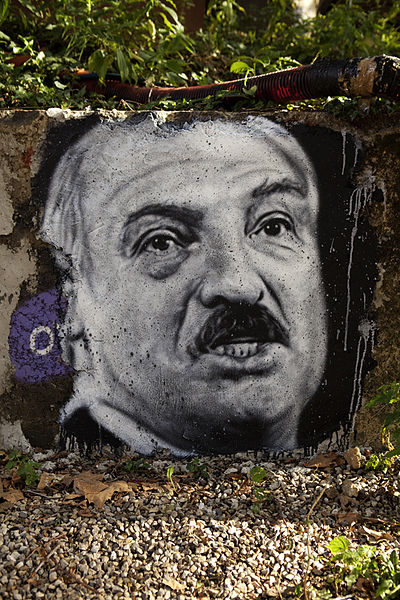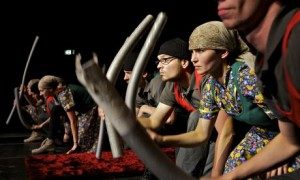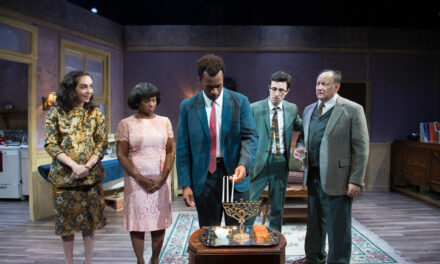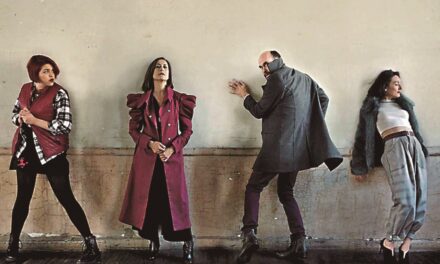“Belarus is not sexy. Sexy countries have oil, gas, diamonds, sea, mountains … Belarus has only people.”
This is the problem faced by Belarusians seeking to attract attention to their plight in Europe’s last dictatorship. With countless other cases of inequity and human rights abuses occurring daily across the globe, why should people care about a landlocked eastern European country they know next to nothing about? Enter the Belarus Free Theatre, an underground drama group from whose work the above quotation is taken, and the subject of this timely documentary by Madeleine Sackler.
When Belarus gained independence in 1991, its citizens expected the nation to follow the course of other post-Soviet states and achieve a gradual transition towards democracy. However, things began to turn sour after Alexander Lukashenko, the director of a state farm, was elected president in 1994. An initially popular figure whose nostalgia for the supposed glory days of the BSSR resonated well with the public, he gradually tightened his grip on power and has not relinquished it to this day. Anyone seeking to oppose him in elections is subject to intimidation, physical abuse and the very real threat of being “disappeared,” as was the case with several opposition leaders in the 1990s. Protests against unfair referendums and elections have been brutally repressed, and Lukashenko continues to guarantee himself inconceivably high majorities. State censorship has reached absurd levels – one actor recalls an anecdote in which even the deputy minister of statistics has no access to the figures he needs. And in Belarus, they haven’t even bothered changing the name of the KGB.
Against this distressing political backdrop, which is likely to shock the uninformed viewer and would in itself merit a documentary, we watch another narrative unfold: that of the Belarus Free Theatre. Formed in 2005 and persecuted by the government ever since the troupe performs in secret underground locations and only announces its performances shortly beforehand. Its plays cover a wide range of themes, some overtly political and others more intensely personal, and its members all have their own reasons for taking the stage. One is struggling to recover from his son’s suicide, while another previously worked with a state theatre group but grew frustrated and defected to the Free Theatre instead. Nikolai Khalezin, who co-founded the group with his wife Natalia, was an editor at three major independent newspapers and ran an art gallery before the government closed them all down.
What unites the group is an awareness that underground drama is the only real remaining outlet for dissent in Belarus. In each case, these individuals are making a monumental sacrifice, bravely trading the uneventful life of a “law-abiding citizen” for one of uncertainty and fear. As one actor sarcastically explains in the film’s opening, life in a dictatorship is actually very easy – if you play by the rules. We discover that each actor’s transformation into an “unstable element” is the result of necessity more than choice: performing in this theatre simply means having an honest, immediate reaction to the reality of life in Belarus, as opposed to the stifled falsity of a state-approved existence.

The documentary cuts between live recordings of their shows at home and abroad, specially filmed performances, interviews with the group’s members, and footage from the streets of Belarus. Simply making the documentary was in itself an ordeal: any footage from Belarus had to be smuggled out by the cameramen, while Sackler was unable even to visit the country and instead had to do her directing remotely. She presents a sensitive telling of the troupe’s story, paying attention to the drama of their everyday lives as much as to that of their theatre. The point is clear: everyone in Belarus is an actor playing a role, from Lukashenko himself to the street protestors who engage in subversive acts on the public “stage.” The boundary between life and art is shown to be not as rigid as some would like to believe.
My only quibble was with the occasionally melodramatic music, considering that the events and characters of this extraordinary story speak so clearly for themselves. But if this emotional heavy-handedness broadens the film’s appeal and helps it to reach a wider audience, then who am I to complain? The fact is that more people need to see this documentary: it shows us theatre at its most enthralling, daring and vital – and a country that could really do with the attention.
This article originally appeared in Central and Eastern European London Review on December 8th, 2014 and has been reposted with permission.
This post was written by the author in their personal capacity.The opinions expressed in this article are the author’s own and do not reflect the view of The Theatre Times, their staff or collaborators.
This post was written by Jesse Kirkwood.
The views expressed here belong to the author and do not necessarily reflect our views and opinions.


















